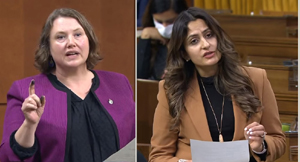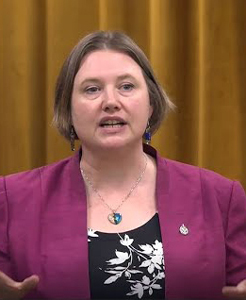Tuesday August 15, 2023 | VANCOUVER ISLAND, BC
Editorial by Mary P Brooke | Island Social Trends
The NDP are pushing for some significant reforms as to supporting the financial well-being of seniors in this country.
Today the NDP Seniors spokesperson, Rachel Blaney, (MP for North Island – Powell River), sent a letter to the Hon. Seamus O’Regan, Jr, pushing him to take steps to ensure seniors in Canada have the financial support they need to meet their cost of living.
O’Regan was very recently appointed Minister of Labour and Seniors, during Trudeau’s July 26 cabinet shuffle. O’Regan has carried other significant portfolios in the federal government over the past several years, and may have the momentum and connections that it will take to really make a difference in this fundamental economic issue.
Blaney has been on top of the seniors file for about four years now. While she engaged politically with the previous Seniors Minister Kamal Khera, there is likely more breadth-of-government experience in O’Regan, that some progress will now be possible.
Blaney also doubled up with NDP Finance Critic Daniel Blaikie in 2021 and 2022 to help low-income seniors receive the GIS that was clawed-back from them after the pandemic.

It will take insight and commitment — and political will — to make substantive change for the financial well-being of seniors in Canada in this decade.

Aging population in Canada:
As the population in Canada continues to grow more top-heavy with seniors (who draw on the budget rather than contribute with taxes from workworld earnings), it’s critical for the federal government to take care of older citizens while also recrafting their budget approach to carrying the cost of the wide range of this country’s social safety net systems.
The better that seniors can take care of themselves (with adequate income) the less they will be drawing on health-care, long-term care and other services that become required more as people age.
Evidence for livable basic income is still clear:
The recently new experiments with the social safety net — such as CERB and the grocery rebate — are powerfully effective for people who need that support, but from an economic policy perspective that’s just tinkering around the edges of current systems. The Employment Insurance (EI) system has not seen any fundamental change since the pandemic — which is hugely disappointing given how CERB proved to help keep people afloat (and prevent social disarray) and how EI was wholly inadequate to address transition.
There is huge transition coming in society as the economy and job market change. A revised EI system — better reframing it as a livable basic income in a system where people could draw from temporarily during transitional times — is more inline with the vision that the Liberals say they have for this country. Especially as more immigrants arrive in great number, there needs to be financial flexibility for people to put a roof over their head and pay for the basics of life.
More seniors living at risk of poverty:
“Far too many seniors are living in poverty at risk of becoming unhoused or are already experiencing homelessness, the federal government is clawing back their benefits, or they are forced to make the difficult choice between buying their medication and buying food,” Blaney writes.
Rachel Blaney in her letter urges Minister O’Regan to take steps now to ensure all seniors in Canada have a safe, accessible, and affordable place to live, including
● Retroactively apply the 10% increase to Old Age Security for all seniors
● Creating a Guaranteed Liveable Basic Income
● Addressing the taxation imbalance for single seniors who rent
● Amending the Old Age Security Act so seniors are not at risk of losing their Guaranteed Income Supplement because of daunting paperwork.
The 10% increase to OAS was only for seniors age 75 and older. Many seniors age 65 to 74 are still working for reasons of financial necessity. While they may be able to pull it off, the impact on their health will be at the very least one of wear and tear; that will have longer term impacts on the health-care system, not to mention the quality of living for the seniors themselves and the ripple effect of care-related impacts for their families.
The taxation imbalance for single seniors who rent is creative. Hopefully the NDP get some traction on that.
The NDP recognition (and articulation) of the stress load of government paperwork — and the potential loss of program support due to missing deadlines or filling things in improperly — is worth noting.
NDP pressure:
It was the NDP’s small team of 25 MPs who — through the Supply and Confidence Agreement that they have with the Liberal minority government — brought CERB and the grocery rebate to Canadians, as well as the dental program for children under 12 that will soon expand to include teens and low-income seniors.
“The issues I’ve outlined are not difficult to fix but your government so far has refused to do so. My New Democrat colleagues and I will be pressing you to do better,” Blaney says today.

===== RELATED ISLAND SOCIAL TRENDS ARTICLES:
Modern finance: seniors working past 65 (March 6, 2023)
Blaney goes to bat for low-income seniors (February 15, 2023)
GIS clawback still on NDP radar, want one-time emergency payment for impacted seniors (January 21, 2022)
Huge letdown for low-income seniors as GIS clawback repayment promise drags on (December 16, 2021)
===== ABOUT ISLAND SOCIAL TRENDS:
Island Social Trends publishes news of socioeconomic interest at the daily news portal IslandSocialTrends.ca.
Editor and Publisher is Mary P Brooke, B.Sc, Cert PR, who has been covering news from a west shore and Vancouver Island vantage point since 2008.








